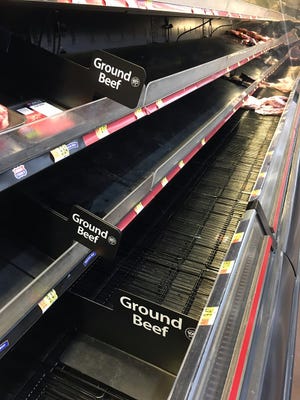Where's the beef? Producers are working hard to get more to consumers as shelves empty.
 Carol Spaeth-Bauer
Carol Spaeth-Bauer
As COVID-19 fears grip the state and the country, grocery shelves in many stores are wiped nearly clean of products such as eggs, butter, milk, poultry and beef. Stores can't restock fast enough, shipments can't come in quick enough, but on the other end of that supply chain are the producers, like beef producers who are losing money even as shelves empty.
Colin Woodall, CEO of the National Cattlemen's Beef Association (NCBA) who recently talked with Lane Nordlund on Lane Cast said that despite the mass panic among commodities causing futures to be "basically divorced from what the true supply and demand is out there," producers need to make sure they can "continue to keep beef flowing because we need to make sure that the product is getting out to the consumer."

"We’re seeing photographs from grocery stores, just everywhere, where those beef cases have been completely cleaned out," said Woodall. "We have to make sure that we are sending a very clear signal to the consumer that there’s more coming and you just need to come the next day because it’s in the pipeline and we’re getting it to you."
Continuing that effort of getting beef products to consumers includes talking to all segments of the supply chain. NCBA has been talking with individual packers to make sure they know what the packers' commitment is and what they are doing so far.
"They have all said very clearly that they have every intention of keeping these plants up and running and make sure they have protocols in place in case they do have sick employees but that is only one part of the equation," explained Woodall. "The other part is making sure the inspectors are there."
If U.S. Department of Agriculture (USDA) inspectors aren't there, it doesn't matter what the intent of the packer may be, they won't be able to keep the plants running. So NCBA talked with the USDA Secretary's office and learned they are committed to having inspectors in place not only for the continuity of business, but also because of financial security and the impact of food security.
"Because if we truly do have a shortage of product because that beef can’t get into the grocery stores then that’s going to just add even more panic and more concern to this crisis," said Woodall. "USDA understands that so they continue to tell us they are doing everything they can to make sure those inspectors are on the job."
Closed schools add concern not only about children getting nutritious lunches "but also if we’re not moving product into the school district, where else is it going?"
"I don't know if we even get to that point," Woodall said. "There is still unfortunately a lot of uncertainties out there that we just don't have answers to. We’re just trying to make sure that we’re doing everything that we can to continue the preparation."
Woodall's message for cattlemen and women was that NCBA is working every day to keep product moving and to make sure there is a market for beef as well as looking at what other options might be available for support for producers who are getting hit hard with low commodity prices right now.
"We are trying to look at every option available to make sure that we are protecting cow/calf producers, stockers, backgrounders and feeders in their efforts to try and better feed this country," Woodall said. "We’re not closing the offices, we’re here to make sure that we can continue that fight."
Carol Spaeth-Bauer at 262-875-9490 or carol.spaeth-bauer@jrn.com. Follow her on Twitter at cspaethbauer or Facebook at https://www.facebook.com/carol.spaethbauer.